Why the Allies did not open a second front in France in 1943
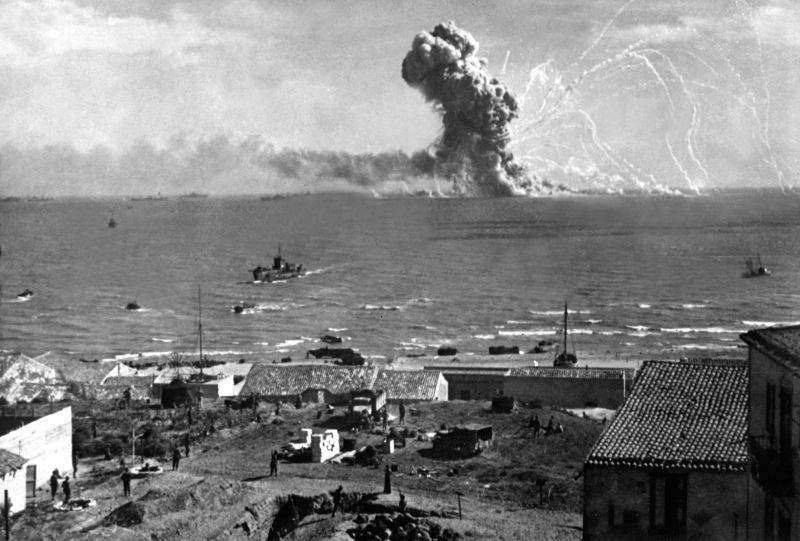
The explosion of the American transport with ammunition "Robert Rowan" during the landing in Sicily near the city of Gela. July 11, 1943
Question of the second front
The Allies in 1943 could open a second front and bring victory over Nazi Germany closer. The allies had all the necessary conditions for this. England and the United States had overwhelming superiority over the Reich in the air and at sea. The Allies had an overwhelming superiority in human and material resources. Only US military production was 1,5 times higher than the military production of Germany, Italy and Japan combined. In 1943 alone, American factories (the United States began preparations for a major war before anyone else) produced almost 86 aircraft, about 30. tanks, 16,7 thousand guns. Great Britain also achieved serious success in the militarization of the economy: in 1943, its industry produced more than 26 thousand aircraft (in 1940 - 15 thousand), 7,5 thousand tanks (in 1940 - 1,4 thousand) , hundreds of warships, etc.
The armed forces of England and its dominions totaled more than 4,4 million people, plus 480 thousand people of colonial and dominion troops, which were intended for internal defense. The US army and navy numbered more than 10 million people: the ground forces - 7,4 million, the fleet - about 2,3 million, the marines - 382 thousand. The fleet of the USA and England was quickly replenished with warships and transports. In 1943, 17 thousand landing ships, ships and barges were built in the USA.
Thus, the Anglo-Saxons had a great advantage over the dispersed forces of the Axis. However, they preferred to wait while the struggle, titanic in scale and intensity, continued on the Russian front. The allies preferred to gradually squeeze out opponents from secondary theaters and fronts.
January 14-26, 1943 in the North African port of Casablanca, a conference of the heads of the United States and England was held with the participation of their military advisers. Stalin also received an invitation to take part in this meeting, but declined. Obviously due to the remoteness of the place. At the suggestion of American President Roosevelt, the meeting participants declared the unconditional surrender of the Axis countries (Germany, Italy and Japan) as a military goal of the United Nations.
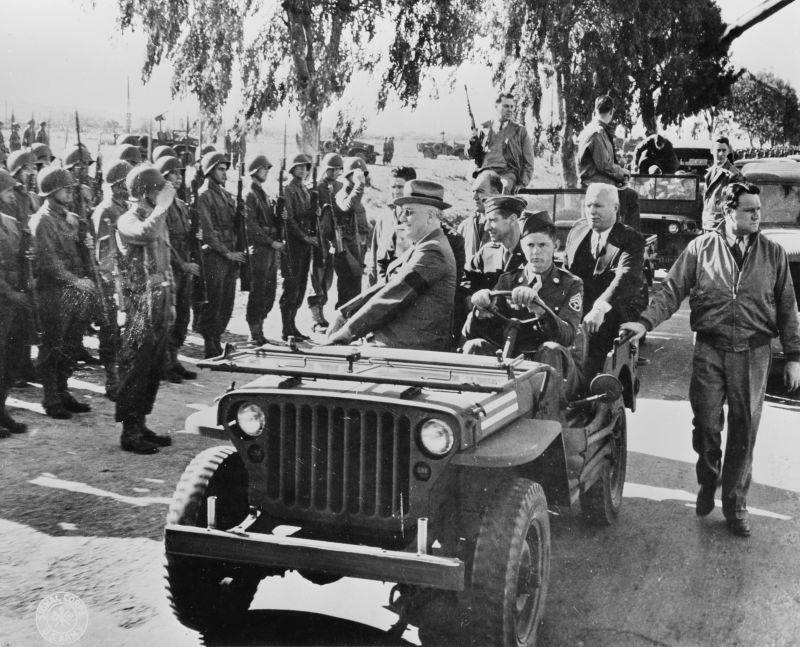
US President Franklin Roosevelt rides in a Jeep "Willis" during a visit to Casablanca
The chief of staff of the American army, General Marshall, spoke out against the "floundering" in the Mediterranean Sea and proposed to launch an invasion of France across the English Channel. However, not all US military supported Marshall. Thus, Chief of Staff of the Navy King and Chief of Staff of the Air Force Arnold leaned towards the British point of view. Roosevelt also did not support Marshall. The general was forced to give in. The British delegation was united on the issue of military strategy - to complete the operation in North Africa and capture Sicily. This was supposed to move Italy to surrender and allowed the invasion of the Balkans to begin. Roosevelt went along with the wishes of Churchill, but did not tie the United States to the Mediterranean theater. The situation could change.
Moscow was informed that Germany would be brought to its knees in 1943. In February 1943, Churchill informed Stalin that the Allies were preparing to land in France in August 1943. This was disinformation.
As a result, the Anglo-American military-political leadership continued the Great Game, directed both against the Axis countries and the USSR. While Russia and Germany were depleting their resources in a titanic battle, the Anglo-Saxons waited, conserving their forces and means, and quickly increased their military potential. The Allies understood that the Russians were seizing the initiative in the war, but it was still unknown how long it would take the Red Army to dislodge the Nazis from the territory of the USSR and then continue the offensive in Europe. Washington and London were waiting for the moment when it would be possible to take all of Europe without a serious struggle. Therefore, Roosevelt and Churchill in 1943, as earlier in 1942, refused to open a second front in Europe by invading France. They proceeded from the fact that the USSR would be bound by a hard struggle with Germany for a long time to come.
In May 1943, at a conference in Washington (the Trident conference), the Anglo-Saxons finally postponed the landing in France to 1944. At the same time, they agreed on joint bombing of Germany. Emphasis was placed on action in the Mediterranean and Pacific theatres. This time accurate information was reported to Moscow. On June 11, Stalin replied to Roosevelt:
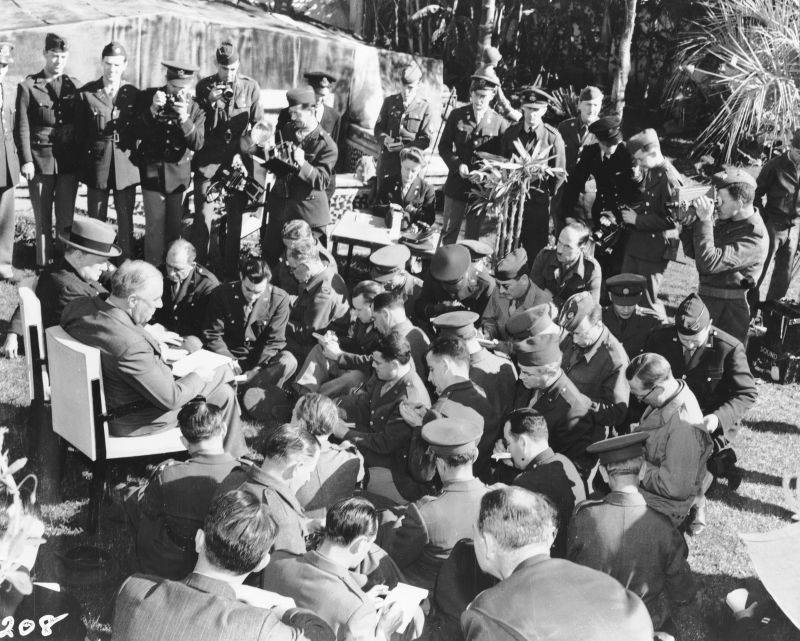
Roosevelt and Churchill announce the results of the Casablanca conference to reporters
Defeat of the Axis in North Africa
In the fall of 1942, the Allies inflicted a decisive defeat on the German-Italian troops in Libya (The defeat of the tank army "Africa" in Libya). On November 8, 1942, American troops landed in Morocco and Algeria, which in fact meant, in the face of the overwhelming superiority of the Anglo-American troops, that the Axis forces fell into a strategic trap (Operation Torch). On January 23, 1943, the British entered Tripoli, the main city of Libya.
During the rainy season, both sides prepared for subsequent battles. In Rome and Berlin, they understood the need to maintain a foothold in North Africa to tie down the Anglo-American forces. Italy and Germany had shorter sea and air links in the Mediterranean for the transfer of troops and equipment to Africa. However, a limited number of troops arrived in Tunisia, and the supply also left much to be desired. Obviously, this was due to Hitler's previous strategy - all the main forces and means were connected on the Eastern Front. The Fuhrer did not want to divert troops, especially mobile formations, and Aviation from the fierce struggle in the East. There is an opinion that from the very beginning the Fuhrer knew that the Anglo-Saxons would wait to the last, without opening a second front. If Russia fell, the possibility of a separate peace would open up.
The difficult situation on the Eastern Front forced the Reich to send all the reserves there. The African front in such a situation was de facto sacrificed. The British and Americans, on the contrary, were building up their forces and resources in Africa. In Rome, it was understood that the fall of the colony in Africa meant the end of the dreams of creating a "great empire" of the Italians. But the best, the 8th Italian army was destroyed in the Don steppes of Russia. The Italian troops, which in 1942, led by Rommel, tried to storm Egypt, were defeated, bled dry and demoralized. The remaining Italo-German troops in Africa experienced an acute shortage of manpower, in weapons, equipment, ammunition and fuel.
On January 12, 1943, Kesselring, appointed commander of the German forces in the Mediterranean theater, reported to Berlin about the shortage of ships to escort transports. He also asked to strengthen the air defense of the ports of Palermo, Naples and Tunisia, to increase the forces of the submarine fleet in the Mediterranean, send reinforcements and weapons. However, the General Staff could not allocate resources to strengthen the German forces in this theater. All resources went to Russia.
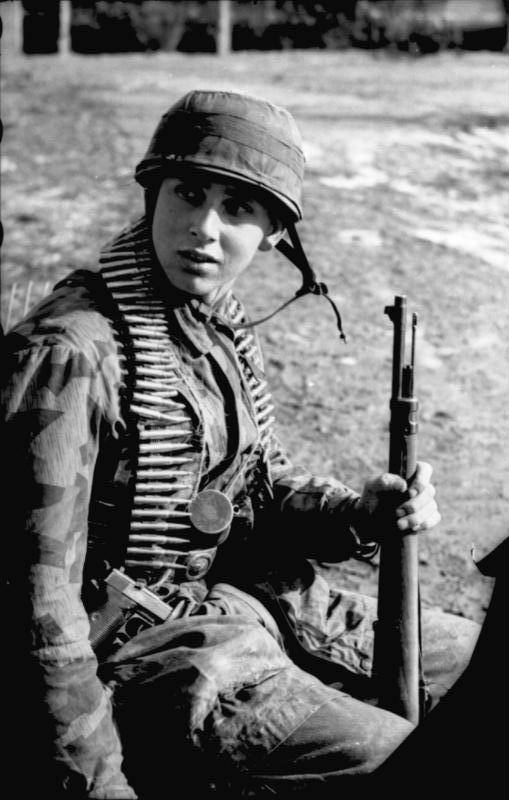
Paratrooper of the assault regiment "Hermann Goering", Tunisia, 1943
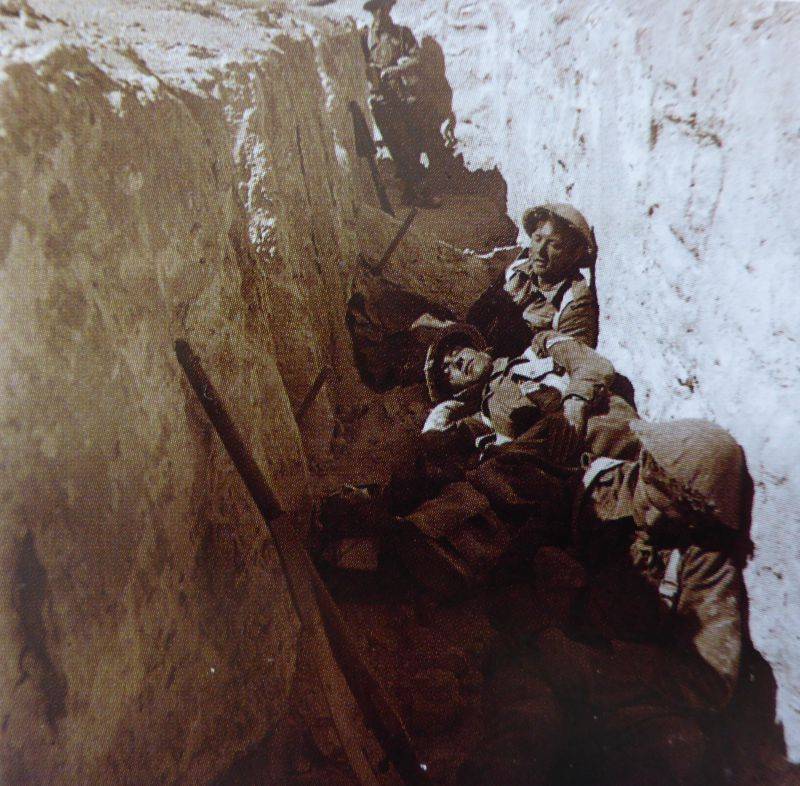
British soldiers sleep in a trench in front of the Maret Line (the fortifications that housed the Italo-German army) in Tunisia. March 1943
Fights for Tunisia
In this situation, the Italo-German troops were supposed to hold Tunisia, a former French colony. The formations transferred from Southern Europe were united in the 5th Panzer Army of General Ziegler (since March, General von First). It included 3 German divisions (10th Panzer, elite air force division "Hermann Goering" and 334th Infantry Division) and 2 Italian divisions, which took up defense in the northern part of Tunisia from centers in Tunisia. The 1st Italian Army (former Panzer Army "Africa") under the command of Rommel, which had 2 German (German African Corps) and 4 Italian divisions (20th Motorized and 21st Army Corps), retreated from Libya. The 1st Army took up defensive positions in South Tunisia along the Maret line. Both armies were part of Army Group Africa under the command of Rommel (since March 1943 - Hans von Arnim). In the German-Italian grouping, there were about 300 thousand people, including 116 thousand Germans.

Tunisia was easier to defend than Libya. Most of its western part, that is, the border with Algeria, runs along the western side of the Atlas Mountains. There were only a few passes through these mountains. In the south, a second line of mountains limited the passages to a narrow gap facing Libya. On one side were the hills of Matmata, on the other, the sea. At one time, the French, fearing the invasion of the Italians from Libya, built a defensive line here up to 30 km deep. It was the Maret line. Only in the north could it be convenient to attack, on the coast. There were two main deep-water ports in Tunisia and Bizerte, from where convoys from Sicily were going. Therefore, the Fuhrer believed that Tunisia could hold out for a long time, holding back and tying the enemy.
Allied forces opposing the Axis forces on the Tunisian front were united in the 18th Army Group (1st and 8th British armies, 2nd American Corps and French units) under the command of British General Harold Alexander. He was subordinate to D. Eisenhower, the commander-in-chief of the North African theater of operations. The allied forces numbered up to 500 thousand soldiers and were able to quickly build up and restore losses.
The Germans, knowing that the enemy was preparing a decisive offensive, tried to forestall him. In mid-February 1943, two German tank divisions of the African Corps (15th and 21st) launched an offensive in South Tunisia, striking at the 2nd American Corps, which was located on the right flank of the 1st British Army. The Germans defeated the American armored division. Developing success, Rommel's troops broke through the Kasserine Pass to strike at the flank and rear of the 1st British Army from the south. The Germans advanced 150 km, causing panic among the Anglo-American troops, who had not yet had such combat experience. The allied command had to take emergency measures to stop the enemy's breakthrough. Mobile units and the Air Force were mobilized. Large forces were thrown towards the Germans. Rommel, having no reserves, tanks, ammunition and fuel, could not build on the first success and withdrew troops behind the Kasserine Pass. By February 25, the situation at the front was restored.
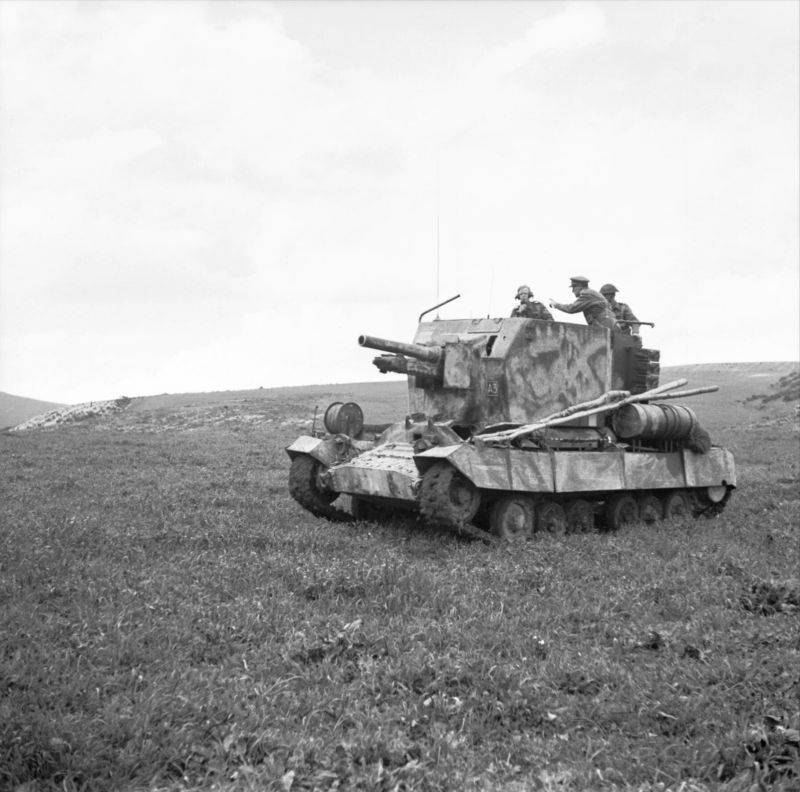
British self-propelled guns "Bishop" is advanced to a position in Tunisia. March 1943
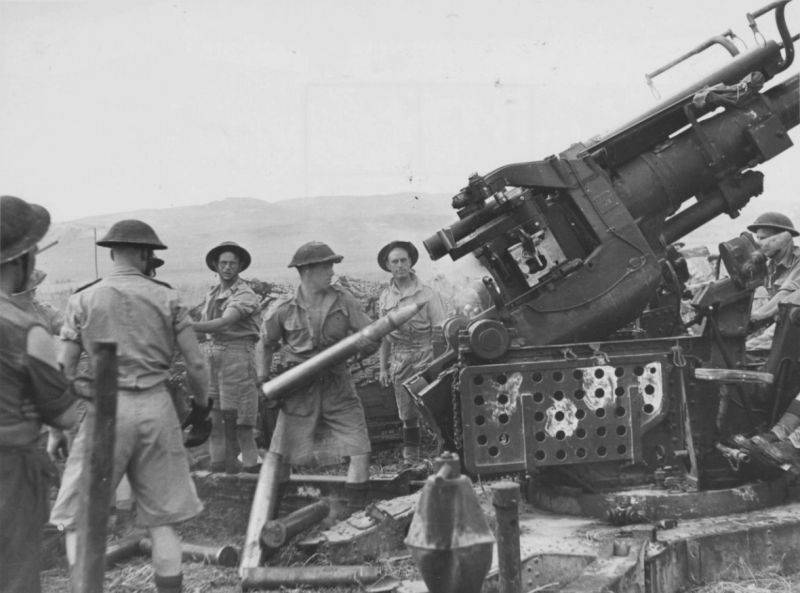
British gunners are firing at German troops from a 94-mm anti-aircraft gun in the area of the Tunisian town of Mediez el-Bab. April 27, 1943
Loss of Tunisia
On March 6, 1943, the Germans attacked the flank of the 8th British Army east of the Maret line. However, the British Eighth Army was well fired on and, knowing Rommel's tactics, set up a strong anti-tank defense. Also, Rommel did not have enough strength for a powerful blow. Therefore, the attack was repelled.
Rommel, convinced of the doom of the Tunisian group, began to insist on urgent evacuation in order to avoid the defeat of Army Group Africa. The commander of the 1st Italian Army, General Messe, was of the same opinion. Hitler and Mussolini refused to evacuate them. Rommel was removed from further participation in the African campaign, and von Arnim became commander of Army Group Africa.
On March 20, 1943, the Allied troops went on the offensive. The fleet and aviation of the Allies completely paralyzed enemy communications in the Strait of Tunisia. The British Eighth Army, with heavy artillery and air support, stormed the Maret Line. On March 8, the German-Italian troops left the fortified line. On April 27, the 7st and 1th British armies joined in the Gafs area and moved on. Now the 8st Army and the 1nd American Corps dealt the main blow.
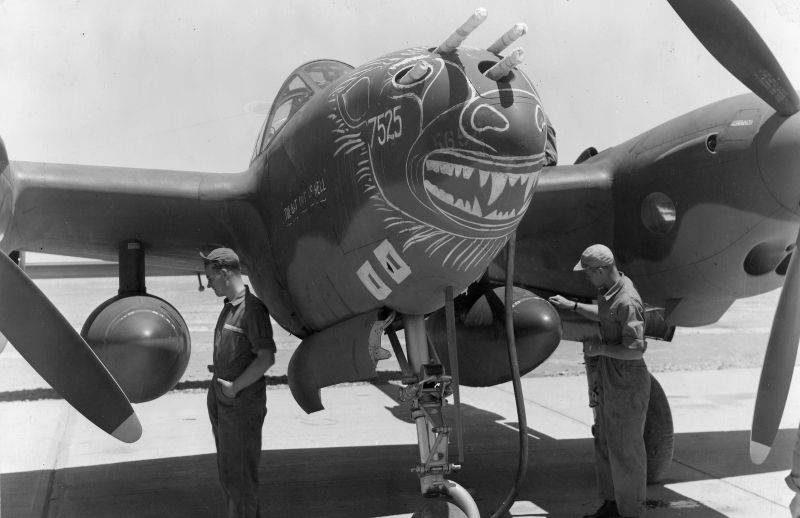
American twin-engine fighter P-38F "Lightning" with the name "Bat from Hell" from the 94th Fighter Squadron of the US Air Force in Tunisia
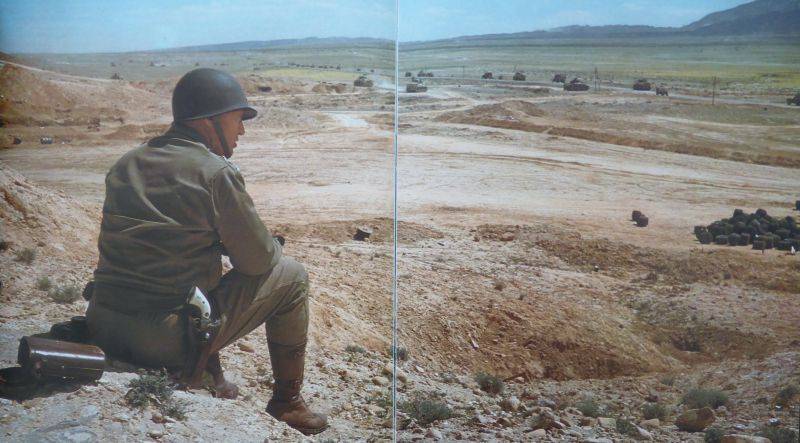
The commander of the 2nd Corps of the US Army, Lieutenant General George Patton, watches the advance of an armored column in the El Guettar valley in Tunisia. March-April 1943
On May 6, the Allies struck a decisive blow. The French units of General Leclerc, who came from the region of about. Chad to connect with the British. The Allies had complete air superiority. Aviation and artillery smashed the defenses of the Germans and Italians. By this time, German formations had already lost tanks and artillery, there was no fuel and ammunition. The Africa group was completely cut off from supply lines.
In a few days everything was finished. On May 7-8, the Allies occupied Tunisia, Bizerte and Ferryville. Italo-German troops huddled in the narrow space of the peninsula, which ended in Cape Bon. On May 12, 8 German and 6 Italian divisions capitulated. In total, about 250 thousand people.
Thus, the Anglo-American forces occupied all of North Africa, strengthening their positions in the Mediterranean theater. Germany and Italy lost the most important foothold in the Mediterranean. Now the war threatened directly to Italy itself.
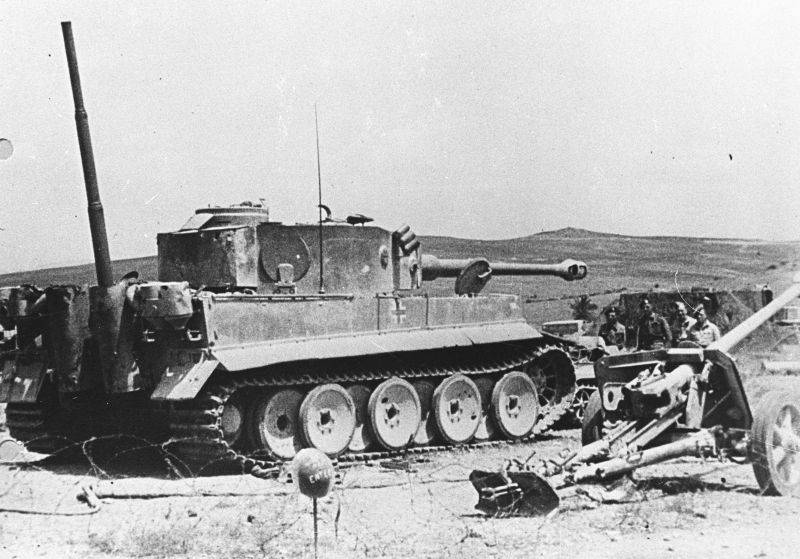
German tank "Tiger" of the 504th heavy tank battalion, captured by the British in Tunisia. Also in the frame is a German 75mm PaK 40 anti-tank gun.
German tank Pz.Kpfw. VI Ausf. E with tail number "131", from the 1st company of the 504th heavy tank battalion, was damaged and captured on April 21, 1943 during the battle with the tanks Mk.IV "Churchill" of the 48th Royal Tank Regiment on the Jebel Jaffa hill in Tunisia. During the battle, the Tiger destroyed two Mk.IV Churchill tanks. In return fire, he received three hits from 6-pounder guns from British tanks. The car, in violation of the order, was left by the crew not undermined. The British also retreated. The next day, climbing the hill, they captured the tank. Subsequently, the car was shown to King George VI and Prime Minister Churchill
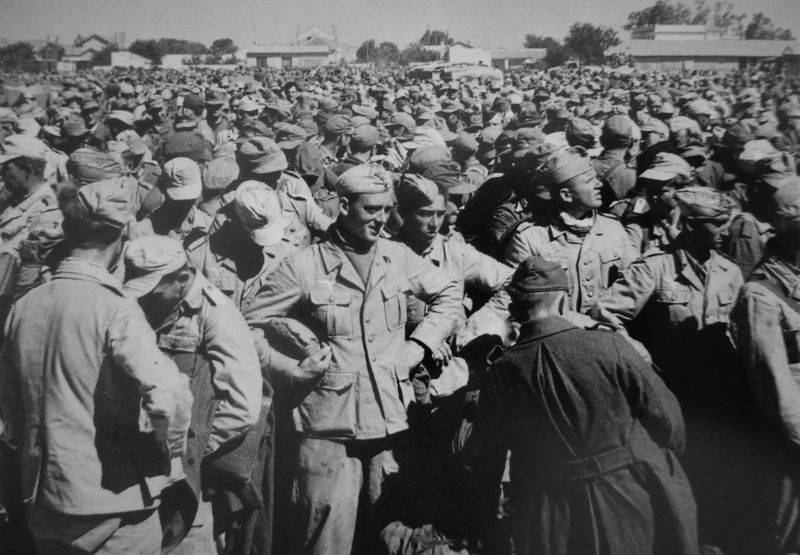
German prisoners of war at the assembly point in Tunisia. May 1943
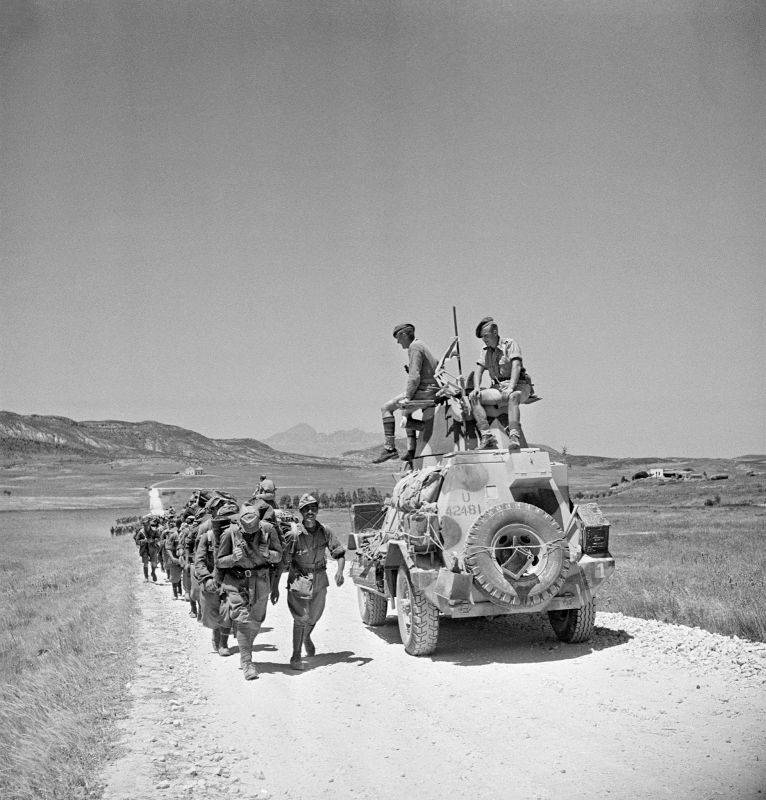
A column of Italian prisoners of war walks past an Allied armored car in Tunisia. 20 May 1943
Information